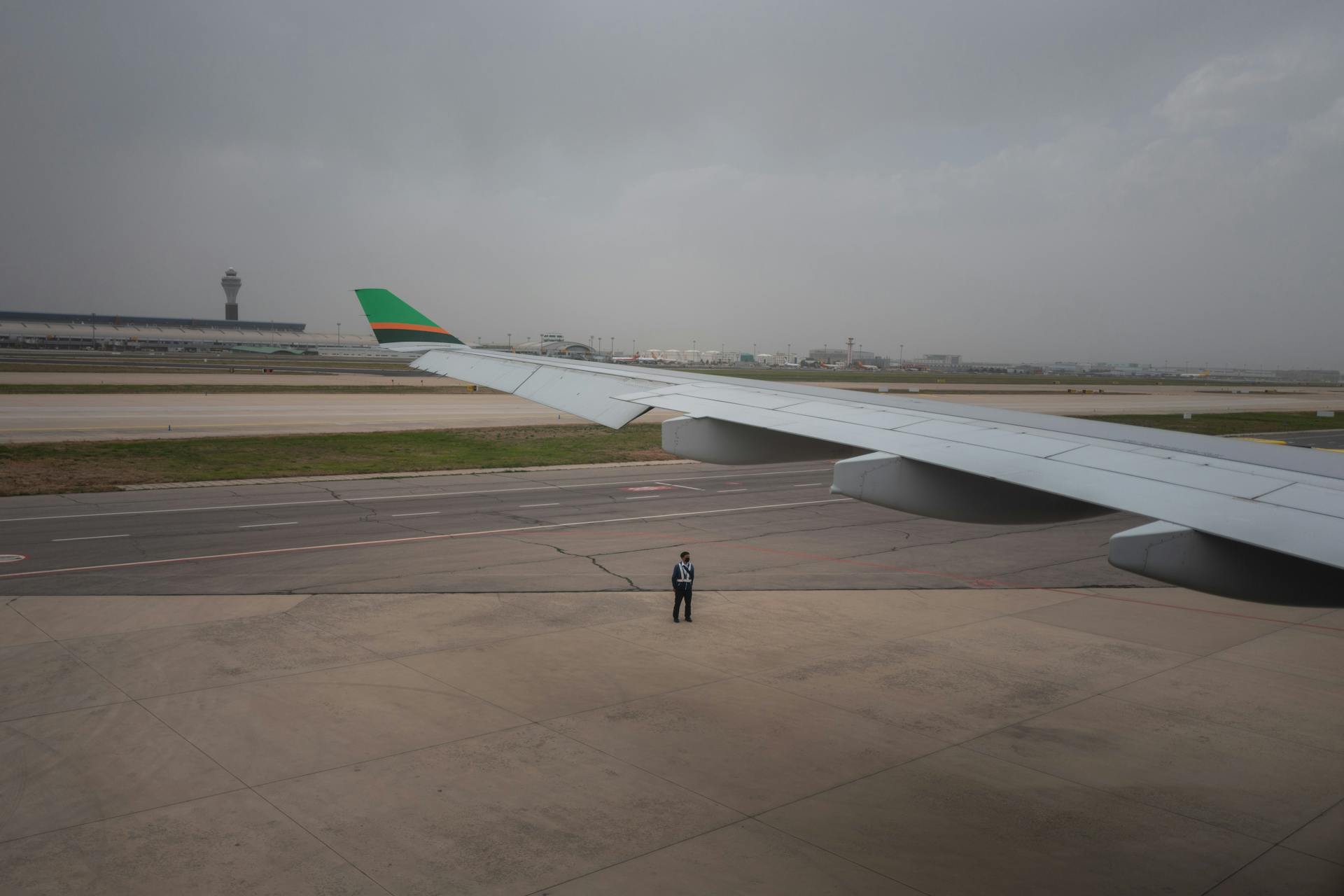
As an EPFO international worker, navigating the complexities of compliance and exclusions can be daunting. The Employee's Provident Fund Organisation (EPFO) is a social security and benefits scheme for Indian workers, but it also has provisions for international workers.
To be eligible for EPFO benefits, international workers must be employed in India for at least 1 year. This rule applies to all international workers, regardless of their nationality or visa status.
However, some international workers may be exempt from EPFO registration, such as those employed by foreign governments or international organizations. These workers are considered 'excluded' from EPFO coverage.
International workers who are employed by Indian companies and have a valid work visa are eligible for EPFO registration.
Filing Requirements
Employers in India must file the IW1 return through Form 5 within 15 days of the close of each month.
The IW1 return must include details such as the names, nationalities, and Universal Account Numbers (UANs) of international workers who are eligible to become members of the EPF for the first time during the preceding month.
Intriguing read: Internal Rate of Return Explanation
Employers must also provide declarations in Form 2 furnished by qualifying international workers, as well as a list of international workers who have left the employer’s service during the preceding month.
The IW1 return must include details of the basic wage, retaining allowance (if any), dearness allowance, and cash value of any food concession paid to each international worker.
Employers must file accurate and timely IW returns to ensure that their international workers can reap the benefits of the EPF scheme without any hassle.
Here's a step-by-step guide to filing the IW1 return:
- Visit the Employer e-Sewa portal (unifiedportal-emp.epfindia.gov.in/epfo)
- Log in to the portal using your employer credentials
- Click on the “Monthly IW-1 (International Workers)” option under the “Monthly Contribution” tab on the dashboard
- Enter the required details, such as the month and year for which the return is being filed and select the establishment and the international workers (IW) eligible to become EPFO members
- Upload the necessary documents, such as Form 5 and Form 2 declarations for each eligible international worker, along with the list of international workers who have left the employer’s service during the month
- Verify the details and submit the IW return
If there are no international workers, the employer is required to send a ‘Nil’ return.
Consequences and Exclusions
Failing to file IW1 Returns on time can have serious consequences. This includes penalties imposed by the IW EPFO, which can vary depending on the delay period and the number of international workers involved.
The EPFO may also take legal action against the employer, resulting in fines, imprisonment, or both. This can have a significant impact on the organization's development pace.
A non-filing of the IW EPFO Portal return can cause inconvenience to international workers who are eligible to become members of the IW EPFO Portal's scheme. They may not be able to avail the benefits of the scheme, such as retirement savings and pension, due to the employer's negligence.
Here are some of the consequences of not filing IW1 Returns on time:
- Penalty: The IW EPFO can impose a penalty on the employer for not filing the IW-1 return on time.
- Legal action: The EPFO may take legal action against the employer for non-compliance with EPF regulations.
- Inconvenience to international workers: Non-filing of the IW EPFO Portal return can cause inconvenience to international workers who are eligible to become members of the IW EPFO Portal's scheme.
Consequences of Not Filing IW-1 Returns
Failing to file IW-1 returns can have serious consequences for employers. Timely and accurate filing is crucial to avoid penalties and legal actions.
The IW EPFO can impose a penalty on the employer for not filing the IW-1 return on time, with the amount varying depending on the period of delay and the number of international workers involved.
Non-compliance with EPF regulations can result in legal action against the employer, including fines and imprisonment. This can have a significant impact on an organization's development pace.

Inconvenience to international workers is another consequence of not filing IW-1 returns. They may not be able to avail the benefits of the EPFO scheme, such as retirement savings and pension.
Here are the potential consequences of not filing IW-1 returns:
- Penalty: The IW EPFO can impose a penalty on the employer for not filing the IW-1 return on time.
- Legal action: The EPFO may take legal action against the employer for non-compliance with EPF regulations.
- Inconvenience to international workers: Non-filing of the IW EPFO Portal return can cause inconvenience to international workers.
Excluded Employee
An excluded employee is someone who doesn't have to follow the same social security rules as others. This can happen if they're employed by a company in a different country, like India.
For example, if a worker is employed by a company in India but contributes to the social security program of their home country due to a mutual agreement between their country and India, they'll be considered an excluded employee.
Related reading: International Insurance Company
International Workers and PF
International workers are employees who work in India but are not Indian citizens. They can be foreign nationals or Indian citizens working abroad in a country with which India has a Social Security Agreement (SSA).
A Social Security Agreement is a bilateral instrument to protect the social security interests of workers posted in another country. Being a reciprocal arrangement, it generally provides for equality of treatment and avoidance of double coverage.
International workers are required to contribute to the Employees Provident Fund (EPF) on full salary, irrespective of where the salary is paid. This means they must contribute the entire amount of their salary to the EPF, not just a portion of it.
The EPFO has clarified that the special provisions relating to international workers must also be followed by Exempted Establishments given exemption under Section 17 of the Employee’s Provident Fund and Miscellaneous Provisions Act, 1952.
To register an international worker, the employer must submit an application in the prescribed format to the Regional Provident Fund Commissioner (RPFC). The RPFC will then forward the application to the International Worker’s Unit (IWU) at the head office for issue of a Certificate of Coverage (COC).
A COC is issued in respect of an employee who is posted by their Indian employer for an assignment to a country with which India has an SSA. The COC is required for international workers to become members of the EPF.
Here are the key points to note about international workers and PF:
- International workers are employees who work in India but are not Indian citizens.
- They must contribute to the EPF on full salary, irrespective of where the salary is paid.
- The EPFO has clarified that special provisions relating to international workers must be followed by Exempted Establishments.
- To register an international worker, the employer must submit an application to the RPFC.
- A COC is required for international workers to become members of the EPF.
The EPFO has also clarified that the special provisions relating to international workers must also be followed by Exempted Establishments given exemption under Section 17 of the Employee’s Provident Fund and Miscellaneous Provisions Act, 1952.
Establishments and Contributions
Any establishment covered under the EPF & MP Act, 1952, including those exempted under section 17 of the Act, that employs an international worker must take note of these provisions.
The provisions apply regardless of where the salary is paid, and in the case of split payroll, the contribution is paid on the total salary earned by the employee.
The contribution is payable on the total salary payable on account of the employment of the employee employed for wages by an establishment covered in India, even for work done outside India.
Contributions
The contribution for international workers is calculated on total wages, which includes basic salary, DA, and all other allowances, as well as salary received in the home country. The employee contribution is 12% of the total wages.
There is no cap on the salary on which contributions are payable by the employer or the employee.
Filing the IW-1 Return
To file the IW-1 return, you'll need to log in to the EPFO's Employer e-Sewa portal, which is found at unifiedportal-emp.epfindia.gov.in/epfo.
The IW-1 return must be filed within 15 days of the close of each month, and it includes details such as the names, nationalities, and Universal Account Numbers (UANs) of international workers who are eligible to become members of the EPF for the first time during the preceding month.
You'll need to fill in the requisite details, including the month and year for which the return is being filed, and select the establishment and the international workers (IW) eligible to become EPFO members.
To complete the IW-1 return, you'll need to upload necessary documents, such as Form 5 and Form 2 declarations for each eligible international worker, along with the list of international workers who have left the employer's service during the month.
The IW-1 return includes declarations in Form 2 furnished by qualifying international workers, as well as a list of international workers who have left the employer's service during the preceding month.
Expand your knowledge: Form 15g Epfo Portal
Here are the steps to file the IW-1 return:
- Visit the Employer e-Sewa portal (unifiedportal-emp.epfindia.gov.in/epfo).
- Log in to the portal using your employer credentials.
- Click on the “Monthly IW-1 (International Workers)” option under the “Monthly Contribution” tab on the dashboard.
- Enter the required details, such as the month and year for which the return is being filed and select the establishment and the international workers (IW) eligible to become EPFO members.
- Upload the necessary documents, such as Form 5 and Form 2 declarations for each eligible international worker, along with the list of international workers who have left the employer’s service during the month.
- Verify the details and submit the iw return.
Employers must file accurate and timely IW returns to ensure that their international workers can reap the benefits of the EPF scheme without any hassle.
Detached Worker
A detached worker is an international worker who is exempt from making contributions to the Indian social security system for a specific period, as set out in a mutual social security agreement between India and their source country.
This exemption is granted based on a mutual social security agreement, which outlines the terms and conditions of the exemption.
An Indian employee sent on posting to a country with which India has an SSA becomes an “International Worker‟ and is required to contribute on full salary.
They can, however, seek exemption from the social security legislation of the country in which they are posted on the basis of a detachment certificate issued in terms of the SSA.
If an Indian employee is directly employed by a local employer abroad, such an employee shall be covered by the foreign country legislation.
PF Judgement Missing Piece

The PF judgement is a crucial aspect of establishing a strong foundation for your financial future. It's often the missing piece that people overlook, but it's essential for achieving long-term financial stability.
The PF judgement refers to the process of evaluating your personal financial situation, goals, and risk tolerance to determine the best investment strategy for you. This involves considering factors such as your income, expenses, debts, and financial goals.
A key component of the PF judgement is assessing your risk tolerance, which can be influenced by your age, financial situation, and investment experience. For example, if you're nearing retirement, you may be more conservative with your investments.
Your investment horizon is another critical factor to consider when making investment decisions. This refers to the amount of time you have to achieve your financial goals, which can impact the types of investments you choose. A longer investment horizon can allow you to take on more risk and potentially earn higher returns.
Ultimately, the PF judgement is about making informed decisions that align with your unique financial situation and goals. By taking the time to evaluate your personal circumstances and risk tolerance, you can create a tailored investment strategy that sets you up for long-term success.
Broaden your view: International Investment Bank
Contribution

International workers are subject to the same contribution rules as Indian workers, with a few key differences.
The Employee Provident Fund (EPF) contribution for international workers is calculated on their total wages, which includes their salary and allowances received in India, as well as their salary and wages received in their home country.
Total wages are defined as whatever wages or salary an international worker receives in India, including basic and all other allowances, and the salary or wages they receive in their home country.
The employee contribution is 12% of the total wages, and the employer contribution is also calculated on the total wages.
There is no cap on the salary on which contributions are payable by the employer as well as the employee.
The contribution shall be calculated on the basis of monthly pay actually drawn during the whole month, whether paid on a daily, weekly, fortnightly or monthly basis.

Effective September 11, 2010, the Pension Fund (8.33%) is calculated on the total wages, whereas prior to the amendment it was calculated on Restricted Wages (Rs 6500/-).
International workers drawing a salary in any currency and in any manner are to be covered under the EPF and MP Act, 1952.
Foreigners employed directly by an Indian establishment would be coverable under the EPF and MP Act, 1952 as IWs and would not be eligible for the benefit of the detachment under an SSA.
Establishments Covered
All establishments covered under the EPF & MP Act, 1952, including those exempted under section 17, must take note of these provisions.
The provisions apply to any establishment that employs an International Worker, regardless of where the salary is paid.
If an establishment has a split payroll, the contribution is paid on the total salary earned by the employee.
Even if an employee's responsibilities are outside India, a contribution is still payable on the total salary payable on account of their employment in an establishment covered in India.
Frequently Asked Questions
What happens to my EPF if I move abroad?
Moving abroad doesn't automatically make your EPF account inoperative, but it may affect future contributions and interest accrual. Check EPFO's current policy for more information on maintaining your EPF account while living abroad
What is the gratuity for international workers in India?
Gratuity for international workers in India is not specified, as the Act only provides guidelines for Indian workers. However, the payment of gratuity is subject to the provisions of the Payment of Gratuity Act, 1972.
Sources
- https://www.setindiabiz.com/blog/monthly-return-iw-1-filing-international-worker
- https://www.pcsmgmt.com/EPF.html
- https://www.taxaaram.com/articles/the-missing-piece-of-epfos-reciprocity-plea-in-pf-judgement-on-international-workers233
- https://www.resolveindia.com/blog/applicability-of-pf-provisions-to-international-workers/
- https://taxguru.in/corporate-law/epfo-faq-on-special-provision-for-international-workers.html
Featured Images: pexels.com


